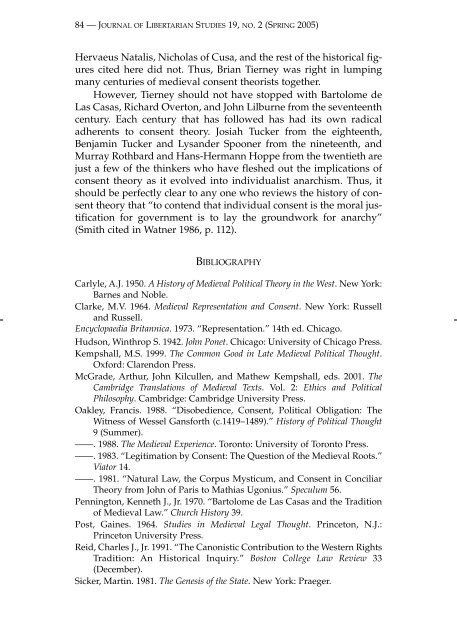Quod Omnes Tangit
Quod Omnes Tangit
Quod Omnes Tangit
You also want an ePaper? Increase the reach of your titles
YUMPU automatically turns print PDFs into web optimized ePapers that Google loves.
84 — JOURNAL OF LIBERTARIAN STUDIES 19, NO. 2 (SPRING 2005)<br />
Hervaeus Natalis, Nicholas of Cusa, and the rest of the historical figures<br />
cited here did not. Thus, Brian Tierney was right in lumping<br />
many centuries of medieval consent theorists together.<br />
However, Tierney should not have stopped with Bartolome de<br />
Las Casas, Richard Overton, and John Lilburne from the seventeenth<br />
century. Each century that has followed has had its own radical<br />
adherents to consent theory. Josiah Tucker from the eighteenth,<br />
Benjamin Tucker and Lysander Spooner from the nineteenth, and<br />
Murray Rothbard and Hans-Hermann Hoppe from the twentieth are<br />
just a few of the thinkers who have fleshed out the implications of<br />
consent theory as it evolved into individualist anarchism. Thus, it<br />
should be perfectly clear to any one who reviews the history of consent<br />
theory that “to contend that individual consent is the moral justification<br />
for government is to lay the groundwork for anarchy”<br />
(Smith cited in Watner 1986, p. 112).<br />
BIBLIOGRAPHY<br />
Carlyle, A.J. 1950. A History of Medieval Political Theory in the West. New York:<br />
Barnes and Noble.<br />
Clarke, M.V. 1964. Medieval Representation and Consent. New York: Russell<br />
and Russell.<br />
Encyclopaedia Britannica. 1973. “Representation.” 14th ed. Chicago.<br />
Hudson, Winthrop S. 1942. John Ponet. Chicago: University of Chicago Press.<br />
Kempshall, M.S. 1999. The Common Good in Late Medieval Political Thought.<br />
Oxford: Clarendon Press.<br />
McGrade, Arthur, John Kilcullen, and Mathew Kempshall, eds. 2001. The<br />
Cambridge Translations of Medieval Texts. Vol. 2: Ethics and Political<br />
Philosophy. Cambridge: Cambridge University Press.<br />
Oakley, Francis. 1988. “Disobedience, Consent, Political Obligation: The<br />
Witness of Wessel Gansforth (c.1419–1489).” History of Political Thought<br />
9 (Summer).<br />
——. 1988. The Medieval Experience. Toronto: University of Toronto Press.<br />
——. 1983. “Legitimation by Consent: The Question of the Medieval Roots.”<br />
Viator 14.<br />
——. 1981. “Natural Law, the Corpus Mysticum, and Consent in Conciliar<br />
Theory from John of Paris to Mathias Ugonius.” Speculum 56.<br />
Pennington, Kenneth J., Jr. 1970. “Bartolome de Las Casas and the Tradition<br />
of Medieval Law.” Church History 39.<br />
Post, Gaines. 1964. Studies in Medieval Legal Thought. Princeton, N.J.:<br />
Princeton University Press.<br />
Reid, Charles J., Jr. 1991. “The Canonistic Contribution to the Western Rights<br />
Tradition: An Historical Inquiry.” Boston College Law Review 33<br />
(December).<br />
Sicker, Martin. 1981. The Genesis of the State. New York: Praeger.
















